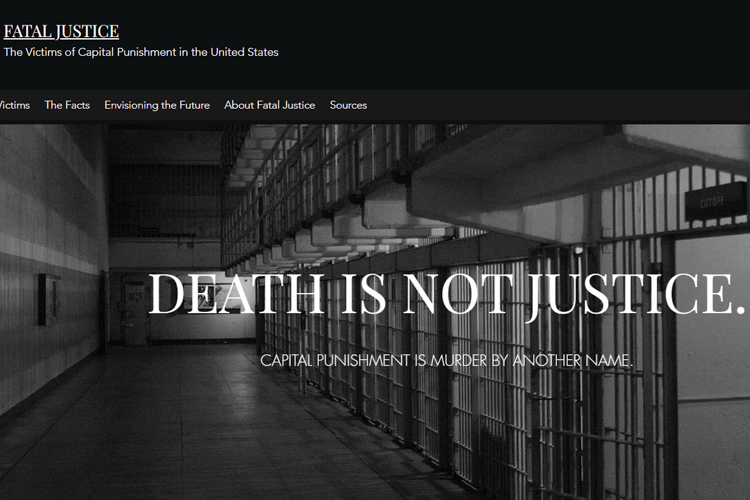Fatal Justice:
An Online Dedication to Victims of the Death Penalty
March 18, 2021
Student: Annie Blanchard Majors: Political Science and Criminology
Every year, the state and federal governments of the United States of America take the lives of individuals convicted of capital offenses. The government having the authority to take someone’s life is horrific in and of itself, and becomes even more so when we consider the myriad of other factors that can come into play when dealing with justice in such a fatal form. While life sentences afford room for proven innocence, appeals, and often redemption, the death penalty provides no such extra luxury to ensure that our justice system abides by its creed of “innocent until proven guilty”. While there is no way of knowing just how many innocent people have been executed in the course of our nation’s history, the number of death row exonerees grows annually, and many people still awaiting execution were convicted prior to the availability of DNA testing. However, regardless of innocence, each and every execution takes a life, not of a murderer or criminal, but of a human being. As long as this barbaric practice is allowed to continue, the American public is complicit in legalized murder, which can never bring closure to a victim’s family. Fatal Justice exists to memorialize the lives lost, innocent or not, for the sake of American “justice”, and to spread awareness about the cruel reality of capital punishment and those affected by it.
"We want a world in which no one must lose their life for justice's sake. Where death and justice are never viewed as synonyms. Where "criminal" is never the first descriptor used for a human being." - Annie Blanchard

BRIAN KEITH TERRELL
[Excerpt from Annie Blanchard's website] "He stole the checkbook from his neighbor, a 70-year-old Mr. John Watson, and wrote out checks in amounts adding up to $8,700, some of them made out to himself. His mother was Mr. Watson’s beloved caretaker, perhaps why Watson told him that if he returned most of the money by the following Monday, no charges would be brought forward. He said he couldn’t repay in time. The next day, Mr. Watson was found dead in his front yard, beaten and shot four times.
His cousin, Jermaine Johnson, had spent a year in jail, facing the death penalty himself, before agreeing to testify against him in exchange for a five-year sentence. Johnson claimed there was pressure by the prosecution to give a false testimony against him." READ FULL STORY
READ STORIES OF OTHERS SENTENCED TO DEATH
[Drawing of Brian Keith Terrell and others by Annie Blanchard.]
Presentation Website
Works Cited
https://anniecblanch.wixsite.com/website/sources



